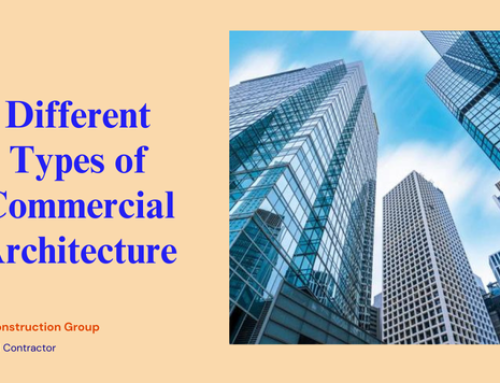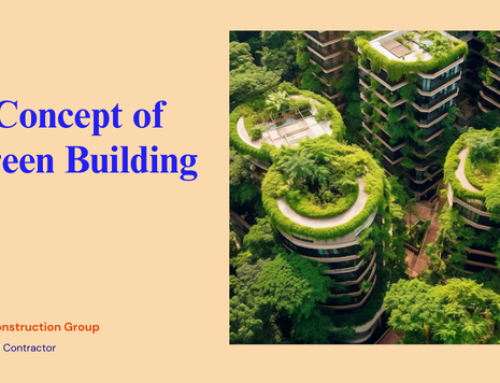If you’re planning to build a new commercial property or renovate an existing one, hiring the right architect is crucial. A skilled commercial architect can help turn your vision into reality.
Choosing the right architect is not a simple decision. After all, you need to ensure that the person you hire will be responsible for keeping the project on budget, listening to your ideas, solving problems, and being the driving force behind the entire endeavor.
To increase your chances of finding the perfect fit, you need to interview each prospective architect. During the interview process, it’s essential to consider the following factors that will help you gauge their suitability for your project.
Here are essential factors to consider before hiring a commercial architect:
Contents
- Who Are Commercial Architects?
- How to Look For The Right Commercial Architect?
- Location
- Type of Commercial Building
- Scope of Work
- Scale
- Feasibility
- Questions to Ask Yourself While Looking For Commercial Architects
- Do You Need a Commercial Architect?
- How to Determine Your Needs for a Commercial Space?
- How to Verify Their Abilities?
- Are They Qualified For the Job?
- What Other Services Do Commercial Architects Offer?
- What About Other Professionals
- Where to Search for a Commercial Building Architect?
Who Are Commercial Architects?
A commercial architect designs buildings for business and commercial use, ensuring they meet both aesthetic and functional needs. Their impact on our environment is significant, with their work visible in cities worldwide, including your community.
The term “commercial architecture” encompasses various types of buildings, such as offices, factories, warehouses, shopping centers, and even hospitals.
Each of these building types has its own unique set of requirements and considerations that the architect must take into account. But, hiring an experienced team of commercial architects ensures your project’s design meets your business and client needs, from basic structure to intricate details.
How to Look For The Right Commercial Architect?
Finding the right architect for your commercial project involves more than just a simple search. While many architects market their services through word of mouth, websites, and a strong social media presence, the real challenge lies in selecting an architect who possesses the right expertise and experience to enhance your project and fulfill your specific requirements.
Here are some detailed factors to consider in your search:
-
Location
Choosing a local architect can offer several advantages. Local firms typically have a better understanding of the site and its geographical context.
This knowledge can be crucial in the early stages of your project, as it allows the architect to consider local climate, zoning laws, and community standards.
Additionally, having a local architect means easier and more frequent site visits, which can streamline the process of compiling site reports and conducting inspections. This familiarity and proximity often lead to a higher-quality end product.
-
Type of Commercial Building
Before you start your search, clearly define the type of commercial building you need. Commercial architecture covers a broad spectrum of building types, such as:
- Office Spaces: Buildings designed for administrative and professional work.
- Hospitals: Healthcare facilities with specific regulatory and functional requirements.
- Government Buildings: Structures used for public administration and services.
- Retail Spaces: Buildings intended for commercial transactions and consumer interactions.
Additionally, some projects may involve mixed-use developments, combining different types of commercial spaces within a single project.
It is important to choose an architect who has specific experience in the type of building you are planning. This expertise ensures they understand the unique challenges and requirements associated with your project.
-
Scope of Work
Commercial architecture projects typically progress through five main stages:
- Schematic Design: The initial phase where the basic concept and layout are developed.
- Design Development: Refining the design, incorporating more details and specific materials.
- Contract Documents: Preparing detailed drawings and specifications required for construction.
- Bidding: Soliciting and evaluating bids from contractors.
- Contract Administration: Overseeing the construction process to ensure compliance with the design.
While it is ideal to have a commercial architect oversee all these stages, some firms may not offer full services or may specialize in only certain stages.
When selecting an architect, ensure they can provide comprehensive services throughout the project.
This continuity can be particularly beneficial for managing detailed drawings during the construction phase and handling contractor selection and contract management.
-
Scale
The scale of your project will significantly impact the selection of your architect. Larger projects may require a team of professionals, including multiple architects and engineers.
When evaluating potential architects, consider whether they have experience with projects of a similar scale and if they are willing to collaborate with other professionals. A firm with a network of reliable engineers and contractors can help ensure the success of your project.
Additionally, firms that offer multiple services in-house can reduce the risk of miscommunications and streamline the coordination process.
-
Feasibility
Conducting feasibility studies is a critical step in any commercial building project. These studies help determine whether the project will be beneficial for your business or asset portfolio in the short, medium, and long term.
An experienced commercial architect can provide valuable insights and industry knowledge to assist with this assessment.
They can help evaluate the financial viability, potential return on investment, and overall practicality of the project.
Considering these detailed factors can find a commercial architect who not only understands your vision but also can bring it to life effectively and efficiently.
Taking the time to select the right professional will pay off in the quality and success of your commercial building project.
Questions to Ask Yourself While Looking For Commercial Architects
Your company’s commercial spaces reflect its values and business processes. When selecting a commercial architect, it’s essential to find one whose values align with yours and who will take the time to understand your project and team’s requirements.
Larger firms may prioritize quick project turnover, while smaller firms often provide more personalized attention and customized solutions.
Consider the following questions when making your choice:
-
Do You Need a Commercial Architect?
Yes, you do. Designing a commercial space might seem like a task you can handle yourself, but architects bring essential knowledge and expertise to ensure your project’s immediate and future needs are met. They help you stay on budget and maintain your design concept.
Architects are trained to think about buildings in ways that maximize both functionality and aesthetic appeal. They understand the intricacies of building codes, regulations, and best practices that a layperson might overlook.
This expertise is invaluable in avoiding costly mistakes and ensuring the project is completed efficiently.
-
How to Determine Your Needs for a Commercial Space?
Involving you as the client in the design process from start to finish is crucial. This collaborative approach helps identify your needs and adapt the design as the project progresses.
Especially if you’re a first-time developer or new to architectural projects, make sure your architect is willing to include you in the process. Open communication from the beginning is key.
During the initial meetings, discuss your vision, business goals, and specific requirements. A good architect will ask insightful questions to help uncover your needs and preferences.
They will also guide what is feasible within your budget and timeline. This collaborative process ensures the final design meets your expectations and functions well for your business operations.
-
How to Verify Their Abilities?
Choose an architect with experience in designing similar buildings or commercial spaces.
This experience leads to quicker, more informed decision-making and valuable insights into your design requirements. Look for a team with a proven track record to ensure the best outcome for your project.
Review their portfolio and ask for references from past clients. Experienced architects should be able to show you examples of their work that align with your project type.
They should also be able to demonstrate how they have successfully managed projects similar to yours, including overcoming challenges and staying within budget and schedule constraints.
-
Are They Qualified For the Job?
Commercial architects must have at least a bachelor’s degree in architecture from a program accredited by the National Architectural Accrediting Board. Additionally, check that they hold a state license and are authorized to practice in your area.
Verify their credentials by checking their license with your state’s architectural licensing board. Professional affiliations can also be an indicator of their commitment to ongoing education and adherence to industry standards.
-
What Other Services Do Commercial Architects Offer?
Commercial projects often involve complex arrangements and require diverse skill sets.
A good architecture firm offers a range of services, including planning, technical drawing, structural design, electrical work, and construction and contract management.
Some firms also provide services like interior design, landscape architecture, and sustainability consulting. These additional services can be beneficial in creating a cohesive and integrated design.
When discussing your project with potential architects, ask about the full range of services they offer and how they can add value to your project.
-
What About Other Professionals
An architect usually coordinates with other specialists, such as interior designers, electrical engineers, exterior or facade designers, and various engineering services.
Their goal is to create functional commercial spaces that meet your needs while simplifying the construction phase by providing coordinated drawings to contractors.
This coordination is essential to ensure that all aspects of the project are aligned and that there are no conflicts between different systems and components.
A well-coordinated project is more likely to be completed on time and within budget, with fewer issues arising during construction.
Considering these aspects can choose a commercial architect who will effectively bring your vision to life and ensure your commercial space aligns with your business goals.
Taking the time to select the right architect will result in a better-designed, more functional, and aesthetically pleasing commercial space that supports your business’s success.
Where to Search for a Commercial Building Architect?
Finding the right commercial architect is crucial to ensuring your commercial space meets all your business needs.
At LUX Construction Group, we understand the importance of finding an architect who aligns with your values and project requirements.
Why Choose LUX Construction Group?
- Experience and Expertise: Our team of skilled architects and designers has extensive experience in commercial architecture, ensuring your project is handled with the utmost professionalism and care.
- Personalized Approach: We take the time to understand your specific needs and provide customized solutions that reflect your business values and goals.
- Comprehensive Services: From initial planning and design to construction management and regulatory compliance, we offer a full range of services to ensure your project runs smoothly.
- Collaboration and Communication: We prioritize open communication and collaboration with our clients, keeping you involved and informed throughout the entire process.
LUX Construction Group is committed to designing and building commercial spaces to meet your current and future needs for decades to come.
Our commitment to excellence and client satisfaction sets us apart in the industry.
Ready to get started? Contact LUX Construction Group today to discuss your project and see how we can help bring your vision to life. Let’s build something great together!






